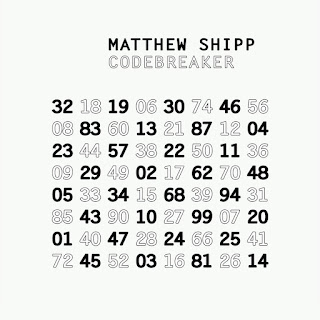Preposterous, I know, but I hereby issue a challenge to pianist Matthew Shipp: try to make music that I don’t love. Go ahead and try! Of course, it’s not a fair challenge, because I decide what I love. Or it just mysteriously occurs inside. Either way, what I’m trying to say is that it astonishes me that this artist can release so much music that I enjoy!
In 2021 alone, (at least) seven albums have been released that feature Shipp’s distinctive approach and sound, including two wonderful trio works: a boisterous album with Francisco Mela and William Parker , and a mysterious and even mystical album with William Parker and Whit Dickey.
But in this solo piano work, he’s alone. Or...maybe it’s not that simple. In his own reflections on this recording, Shipp notes, “It’s very abstract and I don’t know if listeners will hear it, but I hear a line in my playing that’s trying to get into the trajectory that links Bud Powell’s piano playing to Bill Evans.” Hints of the artist’s inspired intent may be found in the album title: Codebreaker (TAO Forms, 2021).
For as much as I enjoy the work of Shipp, there’s a lot that I have yet to hear in his decades-long discography, and therefore I cannot compare the playing and spontaneous composition in Codebreaker to the full spectrum of his prior works. But to me this work feels unique -- and not just in shades, but in hues. This is captured beautifully by the poetry of Mia Hansford in the album’s liner notes:
infinity hues
prelude and allemande to immersion.
Unspooling in andante, a man’s foot or a woman’s,
touching rock, foundation. The map opens, burgeoning
fruit on vines. Vine trailing oak. Oak pared and sunk, or
full and uncut, splaying in the rolling light; notions
of holding. Walk into shadows and their glistening.
Breathe. Feel the skin begin.
There’s a poem for each of the eleven album tracks, and the verse pairs exquisitely with the music. Though the words aren’t recited in the recording, I can hear them in the spirit and animation of Shipp’s voicings. The reader-listener is invited to notice the conversation, sound to word to music to meaning. Each stand alone -- and together.
Most tracks are between three and five minutes long, each offering a gracious tumble of notes and chords, given space to pulse and quiver, together they sing, and more often sweetly than I’m accustomed to hearing from Shipp. The longest track, “Spiderweb,” weaves staccato notes with a tempered urgency, between and around a refrain of warm nostalgia. Here and on other tracks, the soft percussive thuds from the dance of piano pedals can sound like quiet thunder clapping in the distance, suggesting a spacious combustibility. It’s heard also on “Disc,” which opens with a brief swagger, but then charms with a gauzy beauty, a light touch, concluding on a theme that harks of a simpler, almost childlike time.
Sounding almost like a ballad, or as close as Shipp gets to such a form, “Letter From the Galaxy” intimates the complex kind of love that’s proportional to such a vast entity. A few tracks later, the mood has shifted with “Stomp to the Galaxy,” and a bluesy putting-my-foot-down kind of energy emerges from Shipp’s rampant runs to and fro the keyboard. Hansford gives imagery to the cosmic muscle: “Changeful, changing, excavating towns / easy as a glove, shoes tossed to the sky. / The warnings come with melodies as one / enormous, unassuming countenance bearing down.”
Whatever you make of some deep part of Matthew Shipp deciphering the musical trajectory from Bud Powell to Bill Evans, one thing is true: even when you’re utterly solitary with your instrument of choice, or with your thoughts, or with nature, or whatever—in a deeply meaningful sense you’re never really alone. The beautiful music of Codebreaker told me this.

No comments:
Post a Comment
Please note that comments on posts do not appear immediately - unfortunately we must filter for spam and other idiocy.